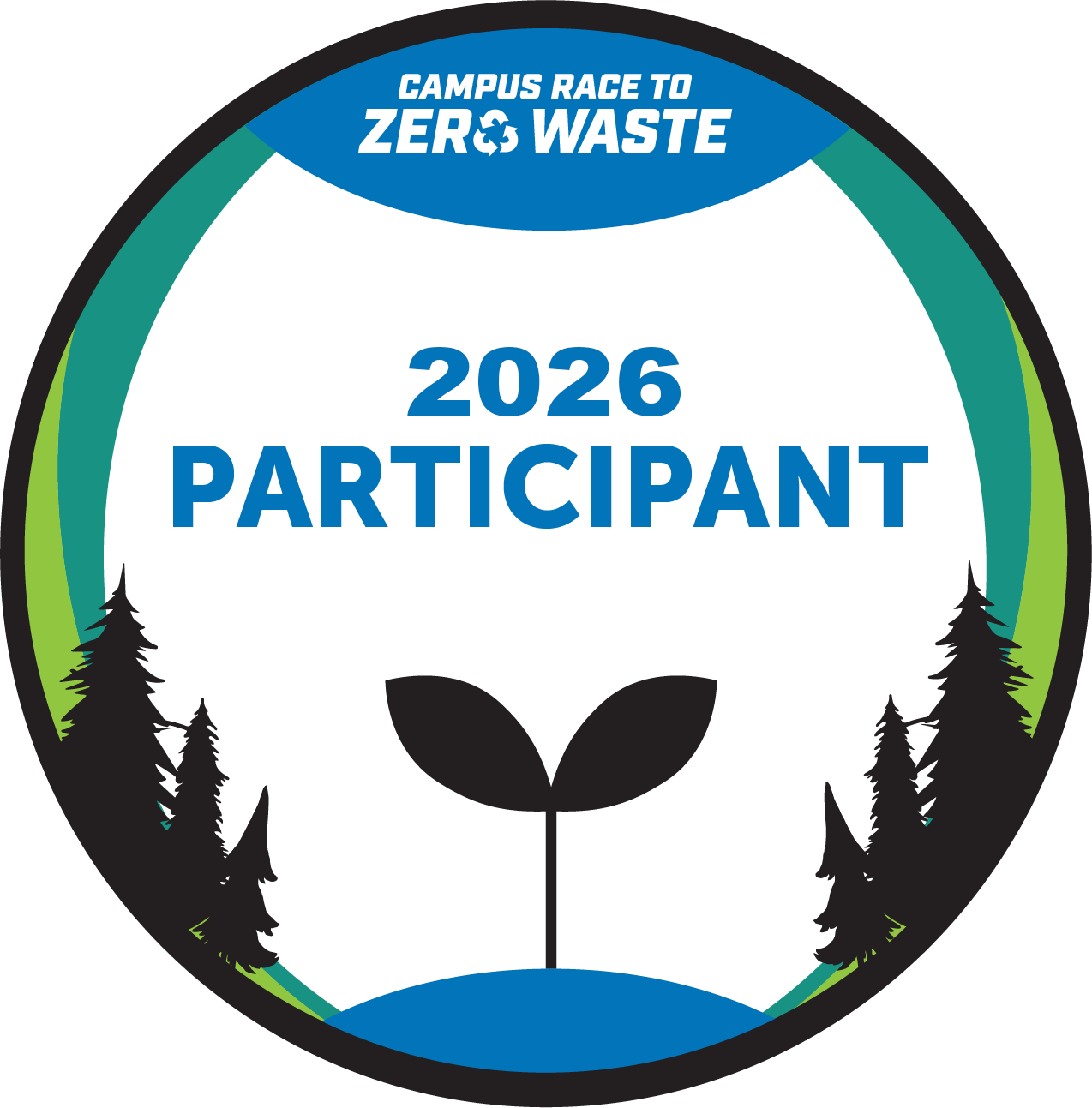2026 Campus Race to Zero Waste
/9x0:595x374/prod01/channel_34/media/seattle-university/cejs/events/campus-race-to-zero-waste/images/Campus-Race-to-Zero-Waste-2026-Logo.png)
Campus Race to Zero Waste 2026
February 1st through March 31st, 2026
Volunteer for Race to Zero Waste
We need your help making Race to Zero Waste happen!
Campus Race to Zero Waste (formerly Recyclemania) is an 8-week waste reduction and diversion competition happening February 1–March 31, 2026 between colleges and universities across North America. Campuses compete to see how well they are doing in their zero waste efforts and gauge how they compare against other institutions. Campus Race to Zero Waste supports Seattle University's participation in the Laudato Si' Action Platform. This will be the 10th year Seattle University participates in Race to Zero Waste. Last year we placed 1st in the diversion category of the competition, and we are eager to defend our title!
For more information on how to sort waste and which items go where, visit the Compost & Recycling page.
Events
When: February 2nd, 3rd, 5th, and 6th, 12-1:30pm
Where: Student Center 2nd floor info table, in front of Cherry Street Market
Description: How much food do we waste each day at lunch at Seattle University? How many compostable to-go boxes are used in Cherry Street? Throughout the first week of February during the lunch hour at Cherry Street Market, we will be collecting compostable to-go boxes and food waste to track how much waste we’re producing. The purpose of this event is to help educate people on where to properly dispose of their food waste, raise awareness of the amount of food waste generated and to-go boxes used every day, and to encourage people to reduce their food waste and to use more sustainable plating options (i.e. traditional plates or Ozzi boxes). We’ll also have volunteers giving "Trash Talks" to help you figure out which items go into which waste bin.
Interested in volunteering at these events? Sign up to support Weigh the Waste and Trash Talk
When: February 18th and March 11th, 8:30am-12:30pm
Where: Bellarmine Turnaround
Description: The annual community recycling day is back and better than ever. Have too much "stuff" or hard to recycle items at home? Get your spring cleaning done early and bring in your dorm, home, or office items that you no longer need to SU’s Community Recycling Days for FREE recycling and item donations! See the Community Recycling Day Flyer
Items Accepted:
- Batteries: Single charge, multi-charge lithium and metal hydride, lead acid, alkaline
- Books: Books of all kinds, in any condition
- Confidential Papers/Documents: Bring in paper bags or boxes- no plastic bags. Will be placed in secure containers for shredding.
- Electronics: Computers/laptops, computer and server equipment, cell phones, TV’s, stereos, VHS/DVD players, etc.
- Electronic Accessories: Power cords, cables, keyboards, mice, CD’s, DVDs, hard disks, chargers, etc. (Hard drives & storage devices will be wiped through a secure data destruction program.)
- Garments/Clothes: All clothes, uniforms, shoes
- Scrap Metal
- Bikes
- Office Supplies: Binders, pens, pencils, paper, etc.
- Plastic Grocery Bags: Clean, dry bags stuffed into 1 bag & tied off
- Styrofoam Blocks, Peanuts, and Other Packaging Materials
- Printer Toner Cartridges: All colors, shapes and sizes
Items not accepted:
NO CHEMICALS, HAZARDOUS WASTE, MATTRESSES, LARGE MACHINERY/APPLIANCES OR FURNITURE
Interested in volunteering for these events? Sign up to support Community Recycling Days
When: February 2nd-27th
Where: Lobbies of residence halls, 4th floor community room at Murphy Apartments, Hub Desk in Student Center, 2nd floor entrance to Lemieux Library
Description: Do you have old, outdated, electronics or e-waste? Donate and/or recycle your old electronics with the SU Recycling team! Throughout the entire month of February, we will collect old electronics and e-waste. If an item has a cord and/or circuitry components, it can be donated. See the E-waste Drive Flyer
When: March 2nd-31st
Where: Lobbies of residence halls, 4th floor community room at Murphy Apartments, Hub Desk in Student Center, 2nd floor entrance to Lemieux Library
Description: Do you need to clear some space in your closet? Look no further than the clothing donation bins that will be on campus. The SU Recycling team will be hosting a clothing collection drive throughout the entire month of March. Clothing will be donated to our partner, Northwest Center. All clothing of any condition (excluding soiled or wet) will be accepted. Items that cannot be used again will be recycled through King County’s Threadcycling program. See the Clothing Drive Flyer
Seattle University's 2026 Competition Goals
1. Engage the SU campus community in zero-waste activities and events while raising awareness about the daily actions we each can take to minimize waste on campus, at home, and in our community.
2. Defend our 1st place title in the diversion category in the overall competition. In 2025, Seattle University placed 1st in the diversion category, effectively diverting 71.04% of waste.
3. Rank within the top 10 schools for the e-waste category.
4. To divert 75% or more materials from the landfill. In 2025, Seattle University diverted over 59 tons of material throughout the competition.
Competition Categories
Seattle University will participate in the following Campus Race to Zero Waste categories:
- Diversion: total amount of material diverted from landfill
- Per capita: combined amount of paper, cardboard, bottles, and cans on a per person basis
- Reduce Food Loss by Rescuing Food (New Category): amount of food recovered and redirected to feed people, feed livestock, or captured for bioindustry uses
- Diverting Food Waste from Landfills and Incineration (New Category): amount of food waste and compostables diverted from landfills and incineration.
- Electronics: total amount of electronics donated and recycled during a one-month period
